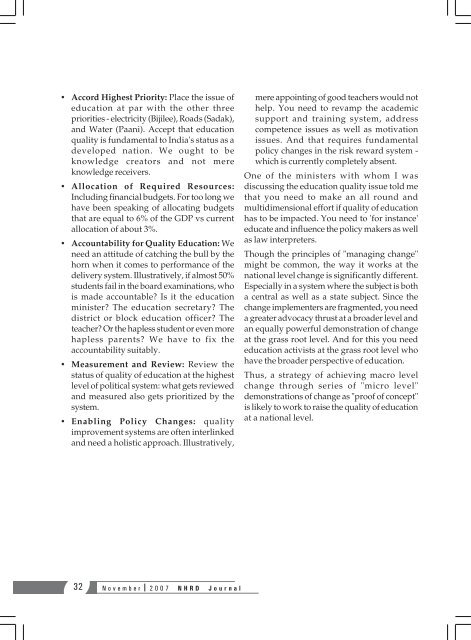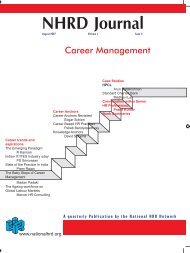NHRD Journal - National HRD Network
NHRD Journal - National HRD Network
NHRD Journal - National HRD Network
Create successful ePaper yourself
Turn your PDF publications into a flip-book with our unique Google optimized e-Paper software.
• Accord Highest Priority: Place the issue of<br />
education at par with the other three<br />
priorities - electricity (Bijilee), Roads (Sadak),<br />
and Water (Paani). Accept that education<br />
quality is fundamental to India's status as a<br />
developed nation. We ought to be<br />
knowledge creators and not mere<br />
knowledge receivers.<br />
• Allocation of Required Resources:<br />
Including financial budgets. For too long we<br />
have been speaking of allocating budgets<br />
that are equal to 6% of the GDP vs current<br />
allocation of about 3%.<br />
• Accountability for Quality Education: We<br />
need an attitude of catching the bull by the<br />
horn when it comes to performance of the<br />
delivery system. Illustratively, if almost 50%<br />
students fail in the board examinations, who<br />
is made accountable? Is it the education<br />
minister? The education secretary? The<br />
district or block education officer? The<br />
teacher? Or the hapless student or even more<br />
hapless parents? We have to fix the<br />
accountability suitably.<br />
• Measurement and Review: Review the<br />
status of quality of education at the highest<br />
level of political system: what gets reviewed<br />
and measured also gets prioritized by the<br />
system.<br />
• Enabling Policy Changes: quality<br />
improvement systems are often interlinked<br />
and need a holistic approach. Illustratively,<br />
mere appointing of good teachers would not<br />
help. You need to revamp the academic<br />
support and training system, address<br />
competence issues as well as motivation<br />
issues. And that requires fundamental<br />
policy changes in the risk reward system -<br />
which is currently completely absent.<br />
One of the ministers with whom I was<br />
discussing the education quality issue told me<br />
that you need to make an all round and<br />
multidimensional effort if quality of education<br />
has to be impacted. You need to 'for instance'<br />
educate and influence the policy makers as well<br />
as law interpreters.<br />
Though the principles of "managing change"<br />
might be common, the way it works at the<br />
national level change is significantly different.<br />
Especially in a system where the subject is both<br />
a central as well as a state subject. Since the<br />
change implementers are fragmented, you need<br />
a greater advocacy thrust at a broader level and<br />
an equally powerful demonstration of change<br />
at the grass root level. And for this you need<br />
education activists at the grass root level who<br />
have the broader perspective of education.<br />
Thus, a strategy of achieving macro level<br />
change through series of "micro level"<br />
demonstrations of change as "proof of concept"<br />
is likely to work to raise the quality of education<br />
at a national level.<br />
32<br />
November 2007 <strong>N<strong>HRD</strong></strong> <strong>Journal</strong>
















